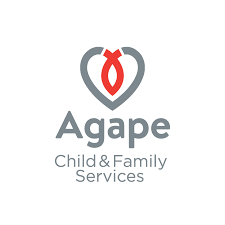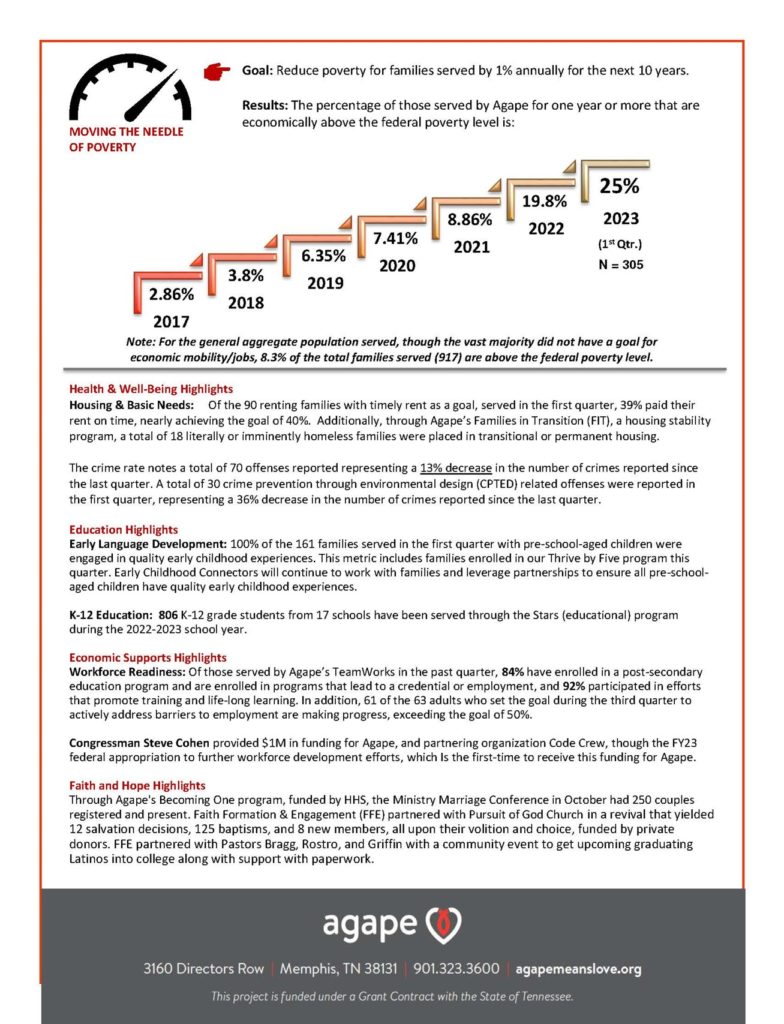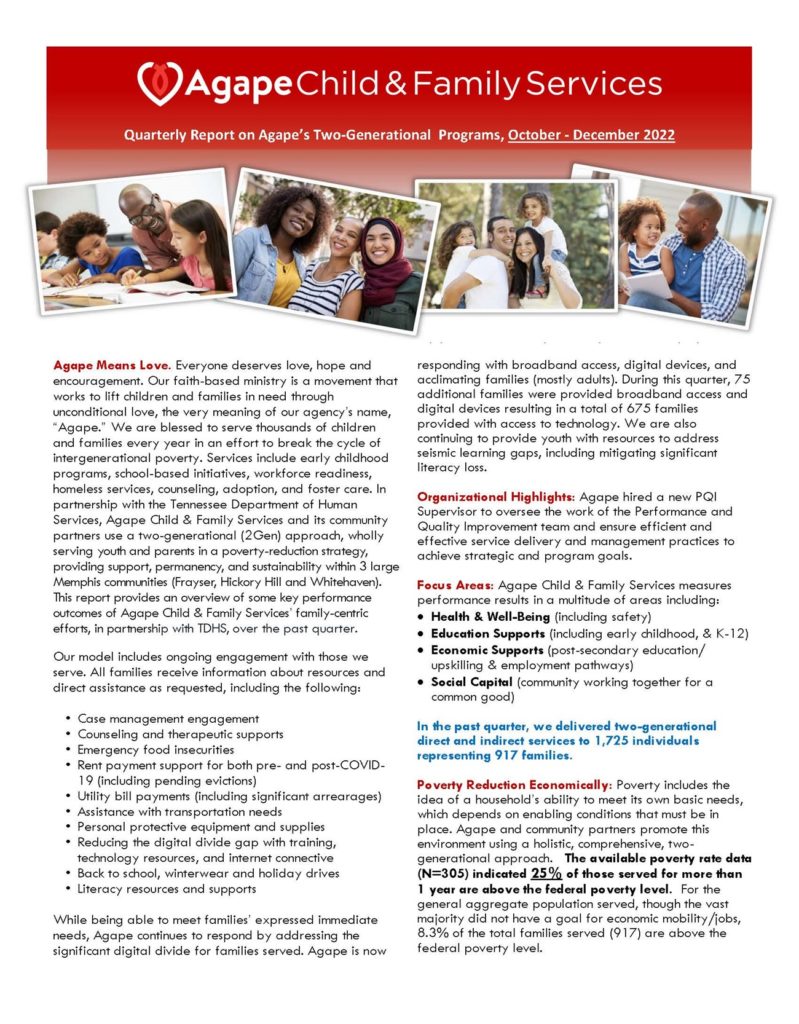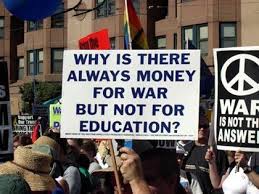The African mantra that it takes a village has special meaning in Memphis when it comes to the work of Agape Child & Family Services.
That’s because in truth, it’s working to create several villages that are working every day to act on a Biblical kind of love – agape – to fight for better lives for people living in neighborhoods of disinvestment that are under-resourced and lacking opportunities.
The oft-quoted African aphorism delivers the message that it takes many people – a village – to create a safe, healthy place where children are given the security and the opportunity to be nurtured and realize their dreams for the future. The village includes families, parents, neighbors, neighborhoods, school teachers, members of the community, and in Agape’s case, a 53-year-old nonprofit organization working through grassroots organizations, schools, churches and more to achieve its ambitious goals for Memphians in need.
It is this convergence at the neighborhood level with the help of Agape staff – there are 30 staff members in 17 schools, mental health therapists, and 36 participating churches – who are working with 1,000-2,000 families to eliminate their specific barriers for better lives.
Demanding More
Agape’s attitude is almost as crucial as its purpose. In fact, they are intertwined. They pursue a mission in a spirit of agape, a Greek word for love mentioned more than 200 times in the Christian Bible.
It is love but it’s not just a feeling. It’s a motivation that drives action for the benefit of others. In that way, it is a love that is born of choice, not obligation. It is considered the purest, highest form of love because it is voluntarily given with no concern for self. Biblically, it is considered the kind of love that God has for his people.
Sitting in his rocking chair in his office in a nondescript building near the airport, Agape President and CEO David Jordan speaks with passion and conviction about the organization’s history that took it from an foster care and adoption service to delivering one of the most comprehensive menu of services in the city.
It was a bold move. It would have been easy to stay with Agape’s founding mission of foster care and adoption but 2008-2009 became a watershed moment for the organization.
“We began to ask what would be doing if we were holistically helping families,” said Mr. Jordan. “We had conversations with families. We talked about strengths and barriers. We had We looked at where children in foster care were coming from dropped back and heard the voice of the people who were asking how they could be kept together. If we are responding deeply, maybe we should go into neighborhoods. That’s what we did. We went deeper.”
The Benefit of Hope
Mr. Jordan, a social worker by profession who has been at the helm of Agape for 27 years, is quick to point out that Agape does not do it alone. Its work is about collaboration and coordination.
“We are relationally engaged,” he said. Beginning its outreach work in Frayser, Hickory Hill, and Whitehaven, Agape is set to expand into Raleigh.
Today, Agape seems to be working on all fronts to break down barriers for families blocked from the lives they seek – fighting poverty, parent engagement, early childhood, job readiness, workforce development, housing, education, the digital divide, rent assistance, mental health support, homelessness, underemployment, safety, anti-blight, unemployment.
“Most of all, it’s about instilling a sense of hopefulness and good will so we’re not at a dead end,” he said, adding that “teamwork” is key in developing pathways to job goals. “It’s about the word on the street about us. We have to build trust, build trust, and build trust.”
Walking the Walk
Along the way, Agape has become one of the country’s largest “two-generation whole family poverty reduction models.” While less than five percent of families ever move out of dire poverty, Agape’s ambition is to reduce the poverty rate for the families it serves by one per cent per year for 10 years.
Its results are outstripping its goals. It just completed the most successful year in its seven years of measuring its poverty reduction work for these families – a remarkable 25%. Three years ago, Agape said it hoped to reach a goal of 20% of families service in 10 years. It has already its ambitions.
At a time when the economic mobility of Black and brown Memphians is a priority for many nonprofits in Memphis, Agape’s approach offers hope but most of all, results. “Our goal is economic mobility and creating pathways to it with a range of partners,” said Mr. Jordan. “We want to get people to $15 an hour or more, $25 an hour.”
“Ford’s Blue Opal is our biggest concern. It could be a big miss. It cold be good for Arlington but what’s it going to do for Frayser? We have to be intentional in what we are doing.”
“Families are beaten down for so long, it’s hard for them to have a vision for themselves,” he said. They have to get through the crisis at hand and we meet them where they’re at. We get them to join us in this walk and to partner with us in humanity.”
Broad Support
He said it is by eliminating policies and practices that buttress structural racism and racial inequities that is key to Agape’s success. Taking a decidedly Christian point of view, crediting God’s help with its success, Agape has been cited as a national model for other cities.
Faced with such a comprehensive program of work and leveraging the social capital to make it work, Agape is raising $25 million, and despite our politically polarized times, its supports runs the political spectrum from U.S. Congressman Steve Cohen to Tennessee Governor Bill Lee. “We want to bring the resources that allow us to expand the poverty-fighting work,” said Mr. Jordan, with an emphasis on scaling the model to change the lives of more people.
Although Mr. Jordan emphasizes Agape’s work first and foremost, his leadership has resulted in his recognition as one of 10 Leadership Memphis Change Makers for 2023. Leadership Memphis writes: “Leadership Memphis considers Change Makers a rare species. While they are mere individuals, they nevertheless changed the lives of others through their actions. Each has impacted our community in a very big and very positive way. Their work has helped enhance the quality of life and livelihoods of others and made Memphis a better place in the process.”









Since actions of organizations like Agape never reduce poverty, I have to remind myself of the essay by Loren Eiseley in his 1978 book — The Star Thrower. Esieley finds himself on a stormy ocean beach that has cast up starfish unto the beach to die. He come upon a man who throws some stars back into the ocean so that they might live. Esieley notes “The Star thrower was mad, and his particular acts were a folly with which I had chosen not to associate myself.” But, after reflection, Esieley concludes “I picked up a star whose tube feet ventured timidly among my fingers while, like a true star, it cried out soundlessly for life. With it, I flung myself as forfeit, for the first time, into some unknown dimension of existence. From Darwin’s tangled bank of unceasing struggle, selfishness, and death, had arisen, incomprehensively, the thrower who loved not man, but life.”
Thanks, David, for the comment. Agape’s measurements show that it is reducing poverty for the families it is serving. There are some other programs in Memphis that are doing it also. It has always seemed to me that the problem is bringing it to scale to actually touch the overall city poverty rate. Do you think think we should not support these kinds of programs?